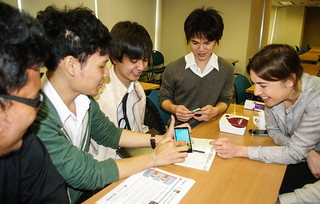Photo Credit: USAID Asia on Flikr
Google Translate - I find this best place to start. If your school is BYOD, 1:1, none of the above. If a student doesn't understand what you are asking of them, why not give them a tool to succeed.
Voki - According to what I have learned, an English language learner is able to write and read, before they will want to or even can speak English. Why not give them a tool to give a voice to what they are writing?
Educreations / Explain Everything / ShowMe - All of these are not the same, but I group them together. This tools give the student the ability to practice reading, writing, and speaking. A assignment could be done as a reflective piece explaining what was learned in class. If a student doesn't know a word that they are trying to explain about, they could always say the word in their native language and just input a picture of the word. I like Educreations because not only is it free but it can also be web-based instead of an app.
Socrative/Polleverywhere - I know these are different ideas behind them, but they can both serve the same purpose. I like to put up a free response question up, and allow students to answer at their will. I have found that many of my ESL students are hesitant to talk, but giving them an anonymous voice breaks down that affective factor. A recent update will even let you embed Polleverywhere polls in to Google Slides Other options that could be used are places like Today's Meet or Chatzy(from Wes Fryer). Both of those are back channels, and I haven't in a specific classroom setting only during PD times.
Aurasma - This app I haven't specifically used in my classes, but I am excited to try this year. I first learned of this app from the great Erin Klein from a blog post concerning Augmented Reality (AR). AR is a new type of technology that delivers a more interactive experience from normally not interactive materials. The idea I want to try is from Erin's blog post that suggest using the word wall cards, and making them interactive. The students, using the app, could make videos, images, or animations that explain each of the words in a more fun and engaging manner. Say for instance the word was photosynthesis, a student could add an "aura" to the word that was a quick video. Or the word was DNA, the "aura" could be an interactive image of DNA could be turned, manipulated, and possible taken apart. Another thought I had, was for my ESL students to create "auras" in their native language. This could benefit both the ESL student, but also the native English speaker helping them learn a new language. That could inspire a conversation on cognates. Like I said I have not had a chance to use this in my class, but am excited of the possibilities.
*As a side note I heard about Erin's blog and Aurasma on the Techlandia Podcast, so thanks guys and gals.
So there it is. A quick list of some of the offerings of technology tools for the ESL learner. There are probably another 5 days worth of reading on ESL tech tools. There is a lot out there, I want to learn more. So that being said, technology is not something we should be trying to get out of our schools. It is something that we should embrace. Our students have embraced, even more so engulfed themselves within it. Why are we trying to take this from them. The average student is walking around with an amazing resources gathering, brainstorming, content creator, data processing tool and we tell them to never take it out. This does not sound like good education. I support my students when they want to use their phones or tablets. I try to teach and instill proper use skills as well. How will they ever know when and when not is a good time to use their phones if we never teach or let them experience? Our students want to learn, are we destroying that desire?
*Note: I had previously posted this in another blog. I thought it was worth repeating here.

